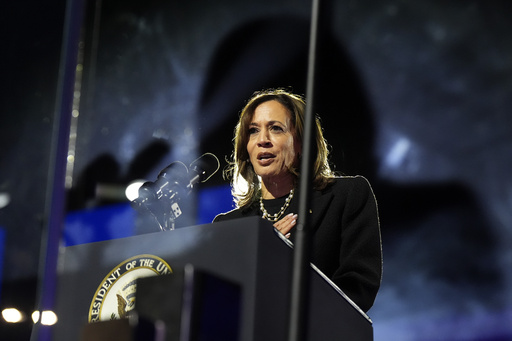Republican candidate Donald Trump has claimed victories in Georgia and North Carolina, successfully capturing two of the seven highly contested battleground states while results from five other swing states continue to be tabulated. As a result of this election, Republicans have regained control of the Senate, securing additional seats in West Virginia and Ohio. The focus now shifts to key House races in New York and California, where Democrats are aiming to recover from the surprising gains that Republicans have made in recent years.
As the election carried on into the early hours of Wednesday, Republicans began to highlight a shift in demographic support among critical voter groups that typically lean towards the Democrat side. Preliminary VoteCast data hinted at a potential decline in support for Vice President Kamala Harris among Black and Hispanic voters compared to four years ago. Approximately 80% of Black voters supported Harris, a dip from the 90% support that Biden received in the previous election. In the case of Hispanic voters, just over half were backing Harris, down from the initial 60% for Biden in 2020. Trump’s support among these demographics seemed to see a slight increase as well, compared to the previous election cycle. Republican Senator Marco Rubio expressed optimism during Trump’s election watch event in West Palm Beach, Florida, indicating that Republicans were already seeing better performance in states like Pennsylvania and Georgia than expected.
Democrats may be experiencing a sense of déjà vu this election night, with parallels between the experiences of 2016 Democratic nominee Hillary Clinton and Harris. Neither Clinton nor Harris made appearances at their respective election night gatherings, despite both believing they would defeat Trump on Election Day. Instead, key aides were sent to inform disheartened attendees that the candidates would not be speaking. The sentiments echoed back to the previous election when both campaigns emphasized the importance of counting votes that were still being processed.
Harris maintains a route to the presidency through Northern battleground states, though the situation appears to be becoming more challenging. Historically, her best chance to reach 270 electoral votes hinged on securing Michigan, Pennsylvania, and Wisconsin—states that Trump won in 2016 but Biden narrowly won in 2020. Harris must not lose Pennsylvania to remain viable for 270, but she still could afford to lose Ohio if she makes up for it elsewhere. However, her options are diminishing, and she cannot afford to lose more than one of these critical states.
As the night progressed, the tone at Harris’s watch party began to shift. A spokesperson for Trump’s campaign took note of the change, suggesting that joy had dissipated from Harris’s event. As midnight approached, the Harris campaign switched off their live CNN broadcast and replaced it with upbeat remixes, as crowd enthusiasm began to wane amid ongoing race calls showing a competitive landscape or apparent victories for Trump.
In a touching moment, Melania Trump shared a photo of her son Barron voting for the first time, expressing her pride in him supporting his father. Barron recently turned 18 and has just begun his studies at New York University.
With Republicans successfully reclaiming Senate control, Sen. Deb Fischer’s reelection in Nebraska solidified the GOP’s power in the chamber, marking their return after four years. With at least 51 Senate seats secured, the Republicans have a considerable influence in Washington, especially regarding confirmation roles for the next president’s Cabinet and potential Supreme Court appointments.
In other election news, Representative Rashida Tlaib successfully won her campaign for a fourth term in the House, representing a district with a significant Arab-American community. Her outspoken criticism of Israel in the ongoing conflict with Hamas has sparked controversy among her colleagues, but she has committed to continuing her advocacy.
In Texas, Republican Sen. Ted Cruz declared his reelection victory as a message for tougher border enforcement. He highlighted substantial support from Hispanic voters compared to previous elections, particularly in South Texas, suggesting a shift in voter sentiment that could alarm Democrats.
As polling concluded for the night, the final state of Alaska closed its polls at midnight EST, while Ohio prepared to make history by electing the state’s first Latino senator, Bernie Moreno, who emerged victorious against several challengers. Moreno’s campaigned highlighted a platform aligning with conservative voters, framing long-serving Sen. Sherrod Brown as too liberal for Ohio’s constituents.
Amid all the celebrations, Erica Lee Carter won a special election to finish her late mother’s congressional term, reflecting the legacy of her mother, Sheila Jackson Lee, who held the position for nearly three decades before passing away in July.
Overall, Republicans are positioned to enhance their majority in the Senate, especially with key races still pending, bolstering their agenda. Simultaneously, Trump’s victory in North Carolina has opened various routes for him to reach the required electoral vote threshold. The atmosphere at Harris’s gathering morphed from celebratory to tense, reflecting the uncertainties as results continued to unfold that night, leaving supporters anxiously awaiting the final outcome.




